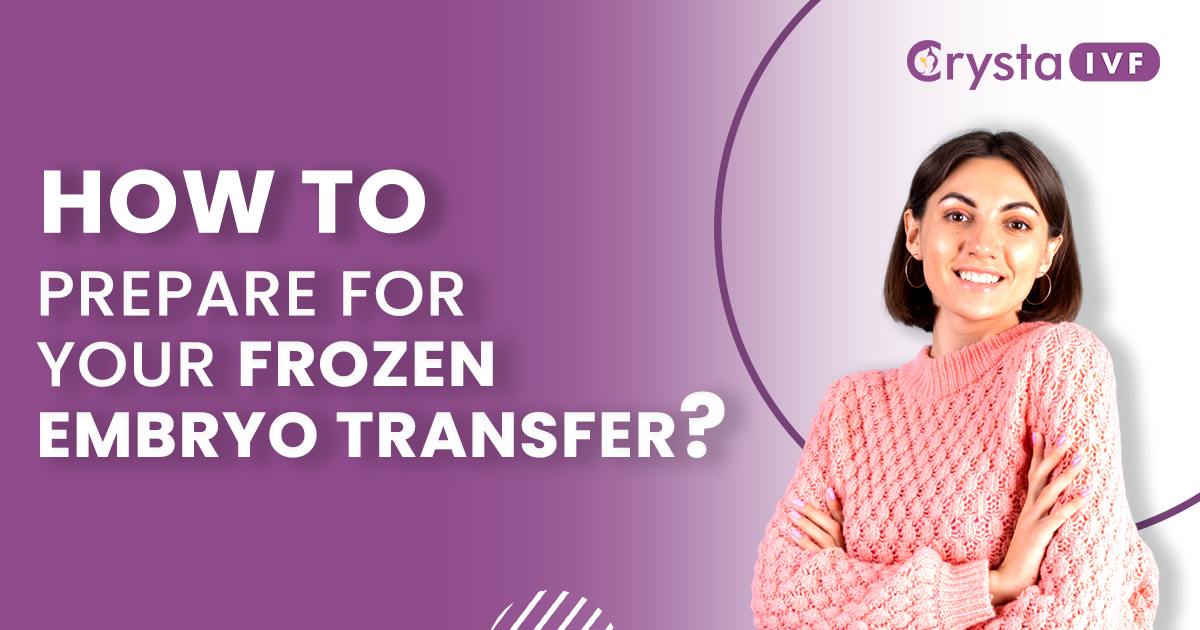If a couple is going for the frozen embryo transfer (FET), it only means they have come a long way in their IVF journey and don’t want to mess it up. The FET procedure is the most critical part of the IVF process.
The time before the embryo transfer can be fearful and worrisome for the couples, as they are unclear about what will happen during the procedure and what they can do to ensure that the FET procedure is successful.
If you are going to go for a frozen embryo transfer and are confused about how to prepare for the procedure, then this blog will help you know everything about FET and how to prepare for it.
If you want to get an expert opinion before going for the FET and you’re in Pune, then you can get in touch with Crysta IVF, the best IVF center in Pune.
Let’s learn all about FET and how to prepare for it.
What Is Frozen Embryo Transfer (FET)?
The FET, or frozen embryo transfer procedure, has become a boon for those who are going for IVF. During the IVF procedure, the eggs that are retrieved are frozen by the process of cryopreservation for later use. These embryos are then transferred into the uterus, and this is the frozen embryo transfer.
Frozen embryo transfer has been seen to have a higher success rate than the normal IVF method, and this is because frozen embryos are required to go through preimplantation genetic testing (PGT). The PGT testing is performed to confirm if there are any issues with the embryo or if there are any chromosomal abnormalities. The embryos with no chromosomal abnormalities have higher chances of turning into successful pregnancies.
Is FET Successful?
Frozen embryo transfer has been observed to be much more successful than the normal IVF procedure.
However, this success rate depends on factors such as age, the embryo’s health, and other fertility-related issues. Even after considering all the factors, the chances of the FET being more successful than transferring the fresh embryo are higher.
With a fresh embryo, the chances of miscarriage and stillbirth are higher, and in the case of FET, the chances of giving birth to a healthy baby are higher.
A study has shown that FET is 60–65% more successful than normal IVF.
Tips To Prepare For The Frozen Embryo Transfer:
Going for the FET procedure brings a lot of stress and anxiety to the couple, so to lessen your worry, here are a few tips to be followed before going into the procedure:
- Get enough sleep: You need to get a good night’s sleep before the day of the embryo transfer.
- Come in for your appointment with a full bladder. Before you arrive, it is suggested that you drink at least 1–1.5 liters of water. To ensure that your embryo(s) are positioned in the best possible location within your uterus, you may experience some discomfort while you wait. A full bladder makes it easier for your doctor to see your uterus during an ultrasound.
- Prepare your bag: The night before, prepare a bag and lay out some cozy clothes. Plan everything the night before your big day to save yourself from last-minute rushing. It is recommended that you wear loose and comfortable clothing for your transfer.
- Medication: Bring any prescription drugs you were instructed to bring to your consultation.
Food To Eat
It is important to keep your diet in check before the embryo transfer and take your doctor’s advice on what to eat according to your health condition. Some of the most common food items that can be eaten are:
- Healthy fats
- Proteins like fish and chicken
- Fresh vegetables and fruits
- Whole-grain food
These food items help your body adjust to pregnancy better as they have a balanced proportion of all the nutrients required.
Explore more: Foods to Eat and Avoid After Embryo Transfer: A Comprehensive Guide
Chemicals To Avoid
Some items at your home may contain endocrine-disrupting chemicals. These chemicals may disrupt your hormonal balance, which can lead to fertility problems and many others.
These are a few tips that you can follow before going in for a frozen embryo transfer. After the FET procedure is completed, it is important to be careful and take the necessary precautions to prevent any mishaps.
Let’s know about all the precautions that can be taken after a successful FET.

Precautions After The FET Procedure:
There are a few things that you would want to avoid, at least for a few days after getting the frozen embryo transfer done. They are:
- Avoid Having Sex: There have been studies that suggest that after the embryo transfer, the person must give their pelvis a rest. Getting involved in sexual intercourse can lead to uterus contractions, and that is very risky for the embryo when it has recently been implanted. This is why it is recommended for you to avoid involving yourself in any sexual activities for a certain duration.
- Do not ignore troubling symptoms: There are certain symptoms to look for after getting your embryo transfer done. Women who are taking fertility drugs may develop a condition called ovarian hyperstimulation syndrome.
- Don’t take the pregnancy test: You might be tempted to take the pregnancy test just after the procedure has been completed; however, it is pointless to do so. It takes time for the placenta to start releasing enough HCG that can be traced in the urine and to show a positive pregnancy report.
Also Read: Things To Do While You Wait For Your Pregnancy Test After Embryo Transfer
Conclusion:
In conclusion, frozen embryo transfer (FET) is a revolutionary assisted reproductive technology that offers couples flexibility and better success rates as compared to traditional fresh embryo methods. FET has become a cornerstone of fertility treatments worldwide. As we continue to refine our understanding and techniques in this field, FET ensures positive outcomes for couples who are dependent on the procedure for beginning their journey toward parenthood.
If you are considering the FET procedure, we encourage you to take the first step toward realizing your dream of becoming a parent by speaking with a fertility specialist at Crysta IVF. Our expert medical procedures give you the best chance of conceiving and carrying a healthy baby to term.
Read More Blogs:
Fruits To Avoid After Embryo Transfer
What are the positive signs to look after an embryo transfer?
Is Exercise recommended During and After Embryo Transfer?
Embryo Development Stages – Everything You Need To Know
Body Changes after Embryo Transfer




